 Symphony No. 9 is a betting and speculation set collection game. The best experience is with three players, which means you must have the A.I. participate if you’re playing with just two. I picked this up during SPIEL last year because I really enjoy the music from that era and had not seen a game with a combination of this theme and mechanics. The thought of trying to push concerts for Beethoven, Schubert, Bach, Handel, Mozart and Haydn by predicting, influencing and even manipulating other players sounded so delightful.
Symphony No. 9 is a betting and speculation set collection game. The best experience is with three players, which means you must have the A.I. participate if you’re playing with just two. I picked this up during SPIEL last year because I really enjoy the music from that era and had not seen a game with a combination of this theme and mechanics. The thought of trying to push concerts for Beethoven, Schubert, Bach, Handel, Mozart and Haydn by predicting, influencing and even manipulating other players sounded so delightful.
Gameplay Overview:
Symphony No. 9 takes place over 6 rounds, and each round consists of three phases: Sponsor Phase, Concert Phase, and Cleanup Phase. Since the starting resource setup favors certain positions within turn order, turn order proceeds clockwise and starting player moves counterclockwise.
During the Sponsor Phase, players take donation cubes; on their first turn they must take 2 for free, then their 2nd turn they can pay $4 for 1, and their 3rd turn they can pay $8 for another. This sets each player at a potential total of 4 cubes during the Sponsor Phase.
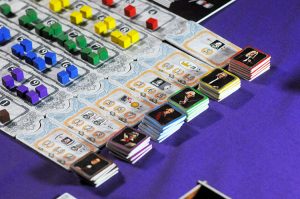
Then the player with the most cubes of a color receive a composition tile for that composer. These each score differently at the end of the game. Please note: when you commission composers that everyone at the table is interested in, that composer is at a higher risk of passing away due to creative stress.
During the Concert Phase, the popularity of composers is adjusted based on the rightmost uncovered space of career track; in other words, if everyone is dying to have this composer write music for the concert then they are considered more popular. If you decide to play with the track that mirrors the actual composer’s musical career, then you are just speeding up the time and variability on their popularity. Strangely, the royal court needs the patrons’ collective financial help before running a successful concert.
This is where players can discuss plans together, but you are never committed to following through, especially considering contribution values range from $0 to $8. Note that sometimes the court will be “insolvent” and decide to embezzle money from the funds. Also, have no fear if you’ve dedicated your patronage to a dead musician – their works will still be performed. The total contribution from all players will determine which composers will perform.
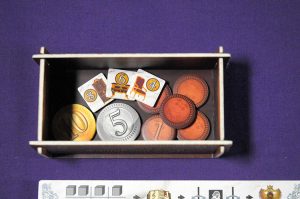
The trick here is that players must pay their contributions regardless if their desired musician was featured in a concert. First off, the collective contribution needs to be in range to run the concert; overspending causes peasants to riot while underfunding is punished by the royal court. The patron with the highest or lowest, respectively, contribution is punished. Luckily, failed concerts do not take the money from the patrons so take back your bid and try again next time.
Because money is tight, whenever you need more of it, you can sell your belongings to the bank. Yet unsold furniture will be worth points since you can never buy your furniture back. You could even contribute furniture tokens to be liquidated during the financing phase.
The game, although eurogame in feel, develops high player interaction through competition over composition –it rhymes!– tiles, successful concerts and eventually which composers have their music featured. The players that win most often find a way to manipulate and control all of these aspects, or find a way to excel at their niche.
After 6 rounds, game end scoring consists of scoring tiles, remaining furniture, money, and finally “last works” receive 1 point for each composition tile you have that belongs to a dead musician.
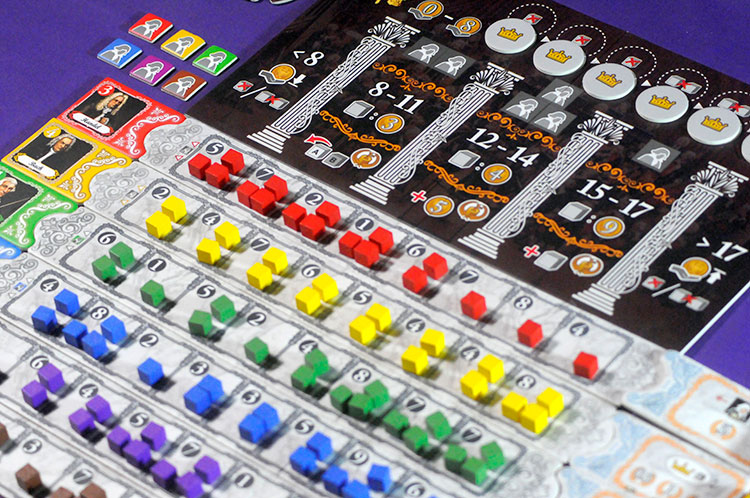
Game Experience:
If you don’t know how to read or predict what your opponents are investing in, this isn’t the game for you as it’s absolutely crucial to understand their priorities. However, if you enjoy manipulating markets in your favor and being tricky about expressing your intentions, this you will enjoy Symphony No. 9. You can also force the change in popularity of specific composers, but as you do this you can push the composer closer to death, in which case you’ve set that opponent up for extra points of investing heavily in a dead composer – and all from your own doing.
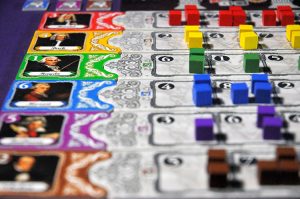
I am mostly entertained by the banter back and forth between opponents on whether they want to threaten to kill off a composer or not. I’ve tried to talk people out of going for specific composition tiles, especially considering that the concerts can feature more than one composer. Sometimes you can develop very loose alliances with people about what concert to try to run.
It’s easy to be able to tell which concert everyone prefers because you don’t want to fund a concert that you have very little influence over. You earn income based on the number of influence cubes you have from the performing composers. There’s always an ebb and flow, since gaining income requires you to cash in influence so you need to convince the composer again in order to guarantee a composition tile – which is where a majority of the points comes from since end game points scale off of how heavily you focused on a specific composer over the “lifetime” of the game.
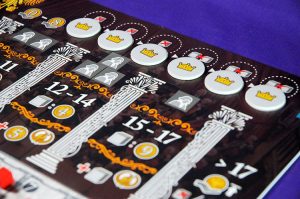
Speculating is a very AP-prone mechanic and this game suffers when played with full count – but then again, what game is actually pleasant with all of the possible players playing? I haven’t tried playing with the bot, but I can imagine that it becomes even more cutthroat with just two players. This game becomes chess-like, setting the other person up for failure or trying to find a niche place to get points that the opponent is not anticipating. It’s also not very easy to catch up, considering if you read the market well and invest well, that you are rewarded and gain income. Though this is similar to real life, where not all investments are lucrative and you can make bad calls on what to do with your money and how much, or how little, you spend of it.
Final Thoughts:
Symphony No. 9 does a good job at helping you practice the balance between acquiring assets, market manipulation, and committing to long-term objectives within the context of planning classical concerts featuring music of well-known composers, alive or dead. The main strategy is facilitating successful concerts to benefit those who speculated correctly and put in the most investment into the concert to reap the rewards.
Final Score: 3 Stars – A betting and speculation game where you must ensure that you are strategically balancing the commissioning of composers with the costs of the concerts you fund.
 Hits:
Hits:
• Era of classical music shines.
• Good balancing of resources and influence.
• Contribution structure encourages some cooperation.
Misses:
• Royal Court contribution is not interesting.
• No opportunities for catching up.
• Player interaction lengthens game time.






















